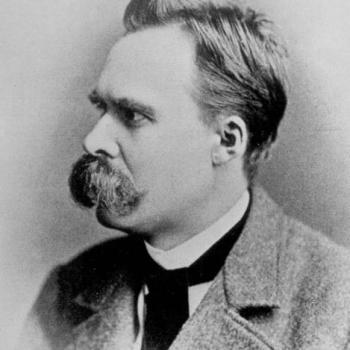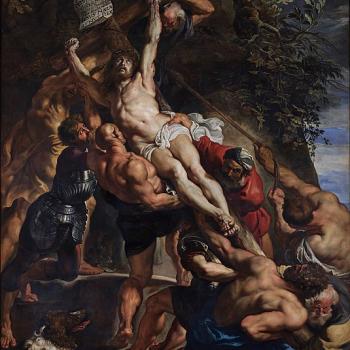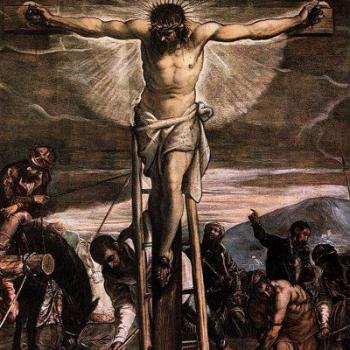This is why we need faith. In the midst of all of this uncertainty, we can depend on our knowledge of God–His revelation, His Word, His promises–even though His ways are not our ways. That includes Christ’s response to the ignorance of His tormenters: “Father, forgive them.”
Now, in context, as Jesus spoke those words, certainly the people who put Him on the cross didn’t know what they were doing. They didn’t know that the hands they were driving nails through were the hands that had created all things and had even knit them together in their mother’s wombs (Psalm 139:13). They didn’t know that the feet they had fastened to the cross were the feet that had walked in the Garden of Eden in the cool of the day (Genesis 3:8) and would soon make the earth their footstool (Isaiah 66:1; Hebrews 1:13). They didn’t know that the head they pressed that crown of thorns into was the head of the One who knows all things. They didn’t know. They didn’t know that in this death was their life. They didn’t know.
But we think we know. That’s the problem, you see. From Adam and Eve down to you and me today. We think we know. We think we know what we’re doing. And therefore we think we know what God should be doing.
Those who put Jesus on the cross thought they knew what they were doing: getting rid of a troublemaker and a blasphemer and someone who was going to bring the wrath of Rome down on their nation. And they thought they knew what God should be doing: that if Jesus really was God that He should jump down from the cross and save Himself. And then those who believed in Him, who believed that Jesus was who He said He was, the very Son of God in human flesh, probably were wondering: What in the world . . . ? Does God know what He’s doing?
That question has often crossed the minds of God’s people, ‘cause how often it seems to us like He doesn’t! We heard it again from the prophet Malachi today. The people were saying: We’re doing what we’re supposed to be doing, what God told us to do, mourning our sins and repenting and sacrificing, but what is it getting us? The arrogant are the ones who are blessed. Evildoers are the ones who are prospering. They are putting God to the test with their sins and evil and perversion and getting away with it – nothing happens to them! Does God know what He’s doing?
Because, after all, we know what God should be doing, right? He should be prospering us, blessing us, giving to us, helping us, making our life easy and punishing them! Does God know what He’s doing? for evil keeps advancing. Does God know what He’s doing? for I keep struggling. Does God know what He’s doing? ‘cause things don’t seem to be getting any better.
But maybe . . . maybe Jesus was right. Maybe it’s WE who don’t know what we’re doing . . .
For how often do things turn out differently than we expected? When what we thought would be good turned out bad? When what we thought would help actually hurt? When we thought we had everything planned out and then . . . And the other way too: when what we dreaded actually turned out good.
The truth is there’s a lot more going on than meets the eye. God tells His people through the prophet Malachi: The day is coming. THEN you will see what you do not now see.
But we want to see it all now. We want God to punish evildoers now. The problem is, if He did so, what would happen to you? You who hurt, you who lie, you who lust, you who doubt and disbelieve, you who covet and take, you who rebel, you who do not love God with all your heart and with all your mind and with all your soul and with all your strength all the time.
There’s a lot more going on than meets the eye. Paul told the Colossians that Jesus is the creator of all things visible and invisible, as we also confess in the Creed. And there’s a lot more invisible than you know. I tend to think of all that God is doing like an iceberg. The part of the iceberg you see floating on the water is only a small percentage, maybe 10%, of all that’s there – most of it is hidden beneath the surface. So we too do not know all that God is doing, how He is working, what He is doing in the world, in your neighbor, and in you.
There’s more going on than meet the eye. And especially is that true of the cross. For yes, contrary to what the eye can see, this is no criminal – this man is the very Son of God, the Lamb of God, the atonement for your sins and mine and the sin of the whole world. Though it doesn’t look like it. Though it look about as far from that as you can imagine. For, in fact, God does know what He’s doing.
And the Day is coming when that will be seen. Malachi’s THEN. The disciples saw it three days after the cross when Jesus rose from the dead. The before looked bleak. The after revealed the truth and the joy.
And so also for us on the last day it will be seen, and not before. Now, in this before time, we have words, we have promises, we have faith. Then it will be seen. But now, we say with the criminal hanging next to Jesus: Remember me! Remember me in my sad state. Remember me when you come into your kingdom.
And He does. For now ascended and in His kingdom, ruling all things for us and for our salvation, Jesus is remembering us and forgiving us and acting for us. And like to the thief next to Him, telling us too: you will be with me in Paradise. When a child or an adult is baptized, Jesus is saying: you will be with me in Paradise. When you believe the Gospel and are absolved, Jesus is saying: you will be with me in Paradise. When you come to receive the Body and Blood of Jesus, He is saying: you will be with me in Paradise. Just as I came to be with you in your misery, so you will be with me in Paradise. And just as I died your death, so you too will awaken and arise with me into Paradise.
















